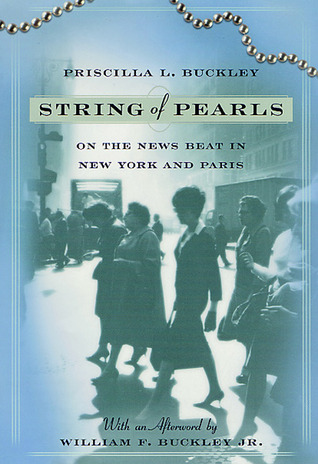Priscilla Buckley has long been well known to readers of conservative journalism. For nearly three decades, she was managing editor of National Review, a constant font of editing skill, institutional knowledge, good humor, and courtesy. She had a 12-year career before NR, however, and it is those dozen years with United Press in New York and Paris that are the subject of this memoir.
Miss Buckley was graduated from Smith College in 1943, a member of one of those few classes of women who were able to find man’s work in the war years of 1942-45. “What none of us realized,” she writes,
was that because at the height of hostilities nearly eleven million young American men were in uniform, jobs in the civil economy that would have been closed to women two years earlier, and would be closed to them three years later when the veterans came home, were there for the plucking. . . . We were the lucky ones.
It was January 1944 when Miss Buckley went looking for work in New York. She had the good sense to turn down a decent salary at the children’s encyclopedia The Book of Knowledge to accept instead just over half the pay—starvation wages—at United Press. It was a choice she never regretted. And her engaging memoir is just what her title suggests: a string of her best anecdotes from those years spent covering World War II and its aftermath.
Miss Buckley tells many good stories. In 1946, as the New York newsroom waited for the FLASH that the Nuremberg war criminals had been hanged, the staff was greatly surprised to see their bosses from the business offices making an unaccustomed visit. This was a story that needed to be handled from the top, they were told. In came the FLASH; quickly, the top man wrote the leader that would go out to all UP bureaus: “Hermann Goering cheated death by committing suicide.” Then the brass left. As the door shut, the newsroom laughed as someone quickly added a clarifying “by hanging” after “death” to the outgoing bulletin.
When in Paris, Miss Buckley covered the restoration of the Moroccan king Sultan Muhammad V and the transfer of power to him from the Berber tribal leader El Glaoui at a ceremony held at a chateau outside the city. Buckley and her friend, Time correspondent Frank White, only managed to view the event through a window, but they could see clearly that, as the 80-year-old El Claoui marched in and began to kneel, the young king rose, took him by the arms, and graciously raised him for an embrace. Consequently, Buckley was greatly surprised to read a few days later, in Time‘s account of the ceremony, that Muhammad V had pushed the old man’s head to the floor. When she asked White about it, he told her he had written what they both had seen, but evidently a New York editor had found the amended version more dramatic. It was the kind of thing that happened to Time and Newsweek correspondents all the time, he said.
Perhaps my favorite story is her simplest one, from very early in her career. Just weeks into her new job at UP, having been assigned to the sports desk over the objections of its editor, Miss Buckley made a mistake in a baseball score. A colleague, responding to the several complaints from local bureaus, sent out a correction, then issued one directly to Buckley herself at the top of his lungs. “Pitts Buckley, you can call Franklin Delano Roosevelt a g——sonofa—–, but you can’t make a mistake in a baseball score!”
This is a book of great charm, funny, and somewhat nostalgic. Though String of Pearls is about news and newsmen, it clearly portrays a New York (and no doubt a Paris, though I can’t speak to that) long gone. Indirectly, despite the fact that most of these tales are about other people, it also presents a clear picture of the author herself—a young woman interested in the world and amused with much of it. Knowing Miss Buckley’s National Review history as many of us do, it is still a bit of a surprise to learn that, in 1956, she was glad to give up United Press and Paris and return to the States to help her younger brother Bill with his new magazine. But then—by by then—Miss Buckley had reached the point where she longed for family and home. I feel certain she has no regrets about this decision, either. As she continues to write in retirement, a memoir of her years at National Review is probably her next envisaged project. If so, I would expect it to make a book as enjoyable as this one.
[String of Pearls, by Priscilla Buckley (New York: Thomas Dunne Books/St. Martin’s Press) 183 pp., $21.95]

Leave a Reply